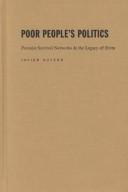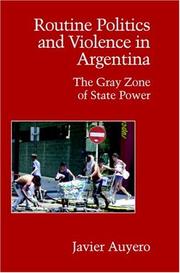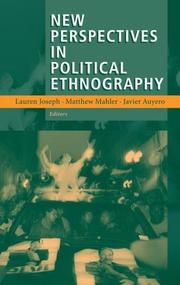| Listing 1 - 10 of 17 | << page >> |
Sort by
|

ISBN: 0822326272 0822326213 0822380048 1283061651 9786613061652 Year: 2000 Publisher: Durham, NC : Duke University Press,
Abstract | Keywords | Export | Availability | Bookmark
 Loading...
Loading...Choose an application
- Reference Manager
- EndNote
- RefWorks (Direct export to RefWorks)
Poor --- Patronage, Political --- Peronism. --- Pauvres --- Favoritisme --- Péronisme --- Political activity --- Activité politique --- Political activity.

ISBN: 9780521694117 9780521872362 9780511814815 051127887X 9780511278877 0511278292 9780511278297 9780511279478 0511279477 051181481X 0521872367 0521694116 1107172101 1280850701 0511277709 051132202X Year: 2007 Publisher: Cambridge Cambridge University Press
Abstract | Keywords | Export | Availability | Bookmark
 Loading...
Loading...Choose an application
- Reference Manager
- EndNote
- RefWorks (Direct export to RefWorks)
Close to three hundred stores and supermarkets were looted during week-long food riots in Argentina in December 2001. Thirty-four people were reported dead and hundreds were injured. Among the looting crowds, activists from the Peronist party (the main political party in the country) were quite prominent. During the lootings, police officers were conspicuously absent - particularly when small stores were sacked. Through a combination of archival research, statistical analysis, multi-sited fieldwork, and taking heed of the perspective of contentious politics, this book provides an analytic description of the origins, course, meanings, and outcomes of the December 2001 wave of lootings in Argentina.
Food riots --- Pillage --- Violence --- Political violence --- Peronism. --- Law enforcement --- Emeutes de la faim --- Violence politique --- Péronisme --- Lois --- Application --- Partido Peronista (Argentina) --- Enforcement of law --- Criminal justice, Administration of --- Justicialism --- Fascism --- Political crimes and offenses --- Terrorism --- Violent behavior --- Social psychology --- Looting --- Plundering --- Sack (Pillage) --- Military offenses --- Robbery --- War crimes --- Bread riots --- Riots --- Peronist Party (Argentina) --- PP --- Policing --- Social Sciences --- Political Science
Book
ISBN: 9781477303665 1477303669 9781477303672 1477303677 9781477303641 1477303642 9781477303658 1477303650 Year: 2015 Publisher: University of Texas Press
Abstract | Keywords | Export | Availability | Bookmark
 Loading...
Loading...Choose an application
- Reference Manager
- EndNote
- RefWorks (Direct export to RefWorks)
Book
ISBN: 0190915579 0190915552 Year: 2019 Publisher: New York, NY : Oxford University Press,
Abstract | Keywords | Export | Availability | Bookmark
 Loading...
Loading...Choose an application
- Reference Manager
- EndNote
- RefWorks (Direct export to RefWorks)
"Over the last few decades, debates about policing in poor urban areas have shifted analysing the state's neglect and abandonment to documenting its harsh interventions and punishing presence. Most of this research has focused on the overt actions and inactions. Yet we know very little about the covert world of state action that is hidden from public view. The Ambivalent State offers an unprecedented look into the clandestine relationships between cops and drug dealers in Argentina. Drawing on a unique combination of ethnographic research and documentary evidence, including hundreds of pages of wiretapped phone conversations, sociologists Javier Auyero and Katherine Sobering analyse the inner-workings of "police-criminal collusion" and its connections to drug markets and the depacification of daily life. Through rich descriptions of the actual clandestine interactions between drug dealers and police, they argue that an up-close examination of covert state action exposes the workings of an "ambivalent state": one that enforces the rule of law while at the same time and in the same place functions as a partner to what it defines as criminal behaviour. The Ambivalent State develops a political sociology of violence that focuses not only on takes place in police stations, criminal courts, and poor neighbourhoods, but also the clandestine actions and interactions of police agents, judges, and politicians that structure daily life at the urban margins. By way of empirical demonstration, the book makes an urgent call for scholars to incorporate clandestine action into explanations of the state. Collusion, policing, the state, crime, violence, urban marginality, legal cynicism, Argentina, ethnography"-- Provided by publisher.
Book
ISBN: 1282053868 0195372948 9786612053863 0199706689 9780199706686 9781282053861 9780195372946 9780195372939 019537293X 6612053860 0199888264 0197743137 9780199888269 Year: 2009 Publisher: Oxford ; New York : Oxford University Press,
Abstract | Keywords | Export | Availability | Bookmark
 Loading...
Loading...Choose an application
- Reference Manager
- EndNote
- RefWorks (Direct export to RefWorks)
In this collaborative ethnography, Javier Auyero and Debora Alejandra Swistun vividly describe everyday life in Flammable and depict how this ongoing, slow-motion environmental disaster is experienced and understood by its residents.
Slums --- Poor --- Hazardous wastes --- Hazardous waste disposal --- Poisonous wastes --- Toxic waste disposal --- Toxic waste release --- Toxic wastes --- Waste disposal --- Wastes, Hazardous --- Factory and trade waste --- Hazardous substances --- Refuse and refuse disposal --- Pollution --- Disadvantaged, Economically --- Economically disadvantaged --- Impoverished people --- Low-income people --- Pauperism --- Poor, The --- Poor people --- Persons --- Social classes --- Poverty --- Slum clearance --- Housing --- Economic conditions --- Déchets dangereux --- Taudis --- Pauvres
Book
ISBN: 1477303669 Year: 2015 Publisher: Austin, Texas : University of Texas Press,
Abstract | Keywords | Export | Availability | Bookmark
 Loading...
Loading...Choose an application
- Reference Manager
- EndNote
- RefWorks (Direct export to RefWorks)
Austin, Texas, is renowned as a high-tech, fast-growing city for the young and creative, a cool place to live, and the scene of internationally famous events such as SXSW and Formula 1. But as in many American cities, poverty and penury are booming along with wealth and material abundance in contemporary Austin. Rich and poor residents lead increasingly separate lives as growing socioeconomic inequality underscores residential, class, racial, and ethnic segregation. In Invisible in Austin, the award-winning sociologist Javier Auyero and a team of graduate students explore the lives of those working at the bottom of the social order: house cleaners, office-machine repairers, cab drivers, restaurant cooks and dishwashers, exotic dancers, musicians, and roofers, among others. Recounting their subjects’ life stories with empathy and sociological insight, the authors show us how these lives are driven by a complex mix of individual and social forces. These poignant stories compel us to see how poor people who provide indispensable services for all city residents struggle daily with substandard housing, inadequate public services and schools, and environmental risks. Timely and essential reading, Invisible in Austin makes visible the growing gap between rich and poor that is reconfiguring the cityscape of one of America’s most dynamic places, as low-wage workers are forced to the social and symbolic margins.
Marginality, Social --- Poor --- Minorities --- Austin (Tex.) --- Social conditions. --- Economic conditions.
Book
ISBN: 9781400865888 Year: 2015 Publisher: Princeton, NJ
Abstract | Keywords | Export | Availability | Bookmark
 Loading...
Loading...Choose an application
- Reference Manager
- EndNote
- RefWorks (Direct export to RefWorks)
Digital
ISBN: 9781400865888 9780691164779 Year: 2015 Publisher: Princeton, N.J. Princeton University Press
Abstract | Keywords | Export | Availability | Bookmark
 Loading...
Loading...Choose an application
- Reference Manager
- EndNote
- RefWorks (Direct export to RefWorks)

ISBN: 1281337846 9786611337841 0387725946 0387725938 Year: 2007 Publisher: New York : Springer,
Abstract | Keywords | Export | Availability | Bookmark
 Loading...
Loading...Choose an application
- Reference Manager
- EndNote
- RefWorks (Direct export to RefWorks)
The use of ethnographic research - social research based on the observation of individuals or institutions where the researcher becomes part of the group or very close to the group to better understand their actions - is becoming more and more of a prevalent methodology within sociology. As ethnography gains prominence within the discipline its focus, theoretical underpinnings and narrative styles are also expanding to the yet-unexamined worlds and institutions of society. Politics, political institutions, and those working in politics (state officials, politicians and activists) have so far missed the lens of the ethnographer. As a group, politicians and those in politics can be found in every corner of the world. While political systems and politicians are by no means the same in every country, what brings these people together to be part of the political process? Ethnography is uniquely equipped to look microscopically at the foundations of political institutions and their attendant set of practices, just as it is ideally suited to explain why political actors behave the way they do and to identify the causes, processes and outcomes that are part and parcel of political life. The volume, based on a special issue of Qualitative Sociology has a two-fold purpose: to bring politics into the ethnographic literature and of ethnography in studies of politics. The case studies included are based on the research of ethnographers studying the various level of politics in Brazil, Japan, El Salvador, Bosnia, the Philippines, India and the United States. It will be of interest to those in the sociology of politics, political science and those looking for ethnographic research on a global level.
Political anthropology. --- Ethnology --- Political aspects. --- Cultural anthropology --- Ethnography --- Races of man --- Social anthropology --- Anthropology --- Human beings --- Anthropology, Political --- Government, Primitive --- Political science --- Anthropological aspects --- Political science. --- Anthropology. --- Political Science. --- Sociology, general. --- Administration --- Civil government --- Commonwealth, The --- Government --- Political theory --- Political thought --- Politics --- Science, Political --- Social sciences --- State, The --- Sociology. --- Social theory --- Primitive societies
Book
ISBN: 9780190221447 0190221445 9780190221454 0190221453 0190221461 Year: 2015 Publisher: Oxford: Oxford university press,
Abstract | Keywords | Export | Availability | Bookmark
 Loading...
Loading...Choose an application
- Reference Manager
- EndNote
- RefWorks (Direct export to RefWorks)
This title examines the causes, forms, and experiences of urban violence in the Americas. It does so through a series of theoretically informed ethnographic analyses of the role that violence plays in the lives of the urban poor in South, Central, and North America. It pays particular attention to the role gangs, illicit drugs, and state responses to drug-dealing play in sky-rocketing levels of violence, and to the responses ravaged communities devise to deal with them.
Urban violence --- Urban poor --- #SBIB:39A4 --- #SBIB:39A74 --- City dwellers --- Poor --- Violence --- Toegepaste antropologie --- Etnografie: Amerika --- Violence urbaine --- --Pauvre en milieu urbain --- --Amérique du Nord --- --Amérique du Sud --- --Urban violence --- Sociology & Social History --- Social Sciences --- Social Conditions --- Urban violence - North America --- Urban violence - South America --- Urban poor - North America --- Urban poor - South America --- Pauvre en milieu urbain --- Amérique du Nord --- Amérique du Sud
| Listing 1 - 10 of 17 | << page >> |
Sort by
|

 Search
Search Feedback
Feedback About UniCat
About UniCat  Help
Help News
News